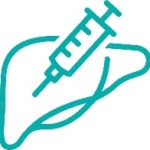Beef
At Farm Vet Services we work closely with our beef clients to enhance animal health and welfare, alongside focusing on productivity. We offer a wide ranges of services, from proactive herd level guidance to 24/7 emergency work.

Bull Fertility Testing
Good fertility is the cornerstone to any beef suckler herd. We offer pre-breeding visits to identify sub-fertile or infertile stock bulls, therefore giving you time to replace a bull or organise alternative breeding measures.

Scanning
We perform routine pregnancy diagnosis, pre breeding scans and foetal sexing. This allows you to batch your cows for calving and feed them appropriately.

Dry Cow Mineral Profiling
By blood sampling and mineral profiling batches of dry cows we can pickup on nutritional imbalances and supplement the cows before calving starts. This should be done approx. two months before calving.

Nutrition
In suckler herds good nutrition is important to fertility, calving ease, calf daily live weight gain (DLWG) and cow colostrum quantity / quality.

Infectious Disease & Health Planing
Through our disease investigation and herd health plans we can reduce the outbreak of diseases such as pneumonia, scour, lameness and Johne’s.

Liver Biopsies
A liver biopsy extracts a small amount of a cow’s liver tissue and is used for pro-active health monitoring of the herd. Collecting samples of liver tissue is the most accurate means of evaluating the trace mineral status of an animal, especially for copper.

Cows like to sleep close to their families and sleeping arrangements are determined by individuals rank in the social hierarchy.
They have excellent sense of smell. They can detect odours from up to five miles away.
Like humans, cows form close friendships and choose to spend much of their time with 2-4 preferred individuals.
They have almost 360-degree sight and can see all colours except for red.
Cows don’t have top teeth in the front of their mouths. Since they’re herbivores they don’t need to chew things up that much. The top of their mouth is a tough pad of skin called a dental pad. They do have molars in the back of their top jaw to help grind food up.
On average, a cow has about 40,000 jaw movements a day.

